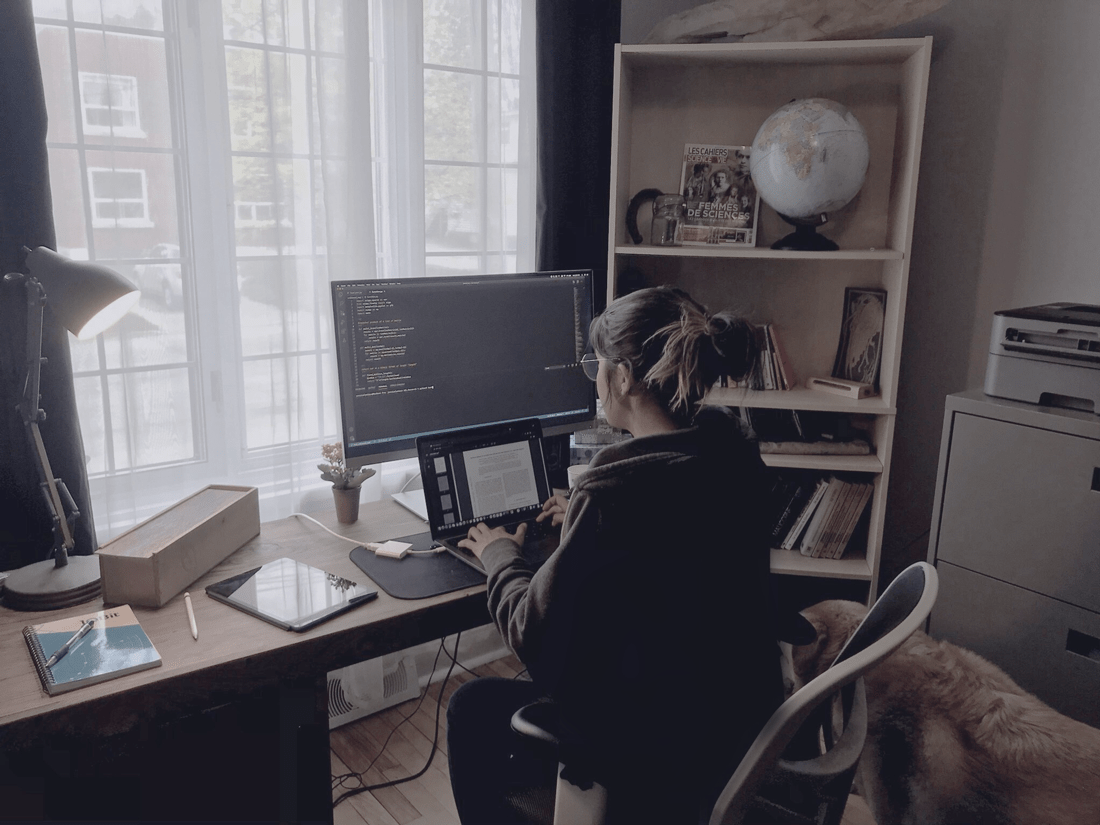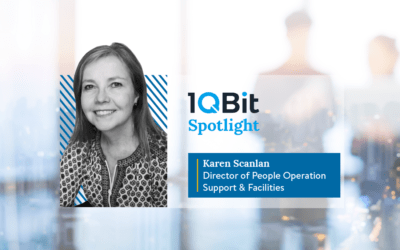Quantum computers will transform our ability to resolve tough problems, such as drug discovery, and optimization problems. Once we have robust quantum computers, they will be the main tools in various R&D fields, and the building blocks of products.
Quantum computing has already had a deep impact on the computing industry by providing a different way to think about information processing. As quantum technology catches up with theory, the impact will only deepen. 1QBit researcher, Jessica Lemieux, started down the path of quantum computing with her decision to pursue her Ph.D. in Physics at the Université de Sherbrooke.
Jessica’s research is on fault-tolerant quantum computing (FTQC), with the main focus being quantum algorithms. FTQC describes the event that an arbitrarily long quantum computation can be done without being overrun by errors, a crucial requirement for robust and practical quantum computing.
While completing her Ph.D., Jessica learned about Mitacs, an organization that connects academia with businesses by placing eligible students into internships. Jessica was awarded a Mitacs internship at 1QBit. After completing her internship, she accepted the offer to continue her research at 1QBit.
We sat down with Jessica to explore her research more, and what she believes is the future of quantum computing.

Working from home in Sherbrooke, Quebec.
What are you currently working on?
I am working on FTQC. My primary objective is to find practical applications for quantum computers. I am mainly working on the design and cost analysis of error-corrected quantum algorithms.
What excites you about your work?
Working alongside brilliant scientists to develop cutting edge technologies is stimulating and rewarding. R&D in quantum information is part of a worldwide effort to build a robust quantum computer.
I am part of a team that works on the many levels of the full stack required to build a quantum computer. The full stack is every component of R&D from applications to software to hardware. Working with the full stack allows us to understand the big picture, and the challenges involved when putting the different parts of the stack together.
What question or challenge were you setting out to address when you started this work?
Firstly, I wanted to understand what types of problems can be efficiently solved by quantum computers. Secondly, I wanted to know how many resources are needed for real-life applications. Answering these questions will determine what is needed for quantum computers to outperform classical computers.
Do you have an analogy or example to help us understand your work?
I am trying to develop efficient software for quantum computers and understand how well they can solve specific problems.
For example, we can estimate the performance of a given quantum algorithm by counting the number of gates required to solve the problem. A quantum gate is an elementary operation applied to quantum bits (qubits). By comparing this number to the number of gates needed for a classical algorithm, we know if a given quantum algorithm could do better than its classical counterpart.

Jessica travelling with friends in Île d’Orléans, Québec.
Why is your research important?
As an example, today’s classical algorithms will run faster on old devices than old algorithms on today’s devices. In other words, developing efficient quantum algorithms could be a game-changer for the first applications of quantum computers.
Finding applications for quantum computers is important in understanding how useful quantum computing will be. Also, knowing the scaling of a given algorithm, and the number of gates it requires, tells us how big and how resistant to noise a quantum device must be to be useful.
What kind of response has your research received?
Understanding the scaling of algorithms and the actual resource count is essential for the industry. As a result, I was invited to speak about my research for events and businesses.
What are the next steps for this work?
It is still too early to tell, but the big picture is to obtain a full-stack blueprint for quantum computers. That is, what capabilities are required to turn the physics of the device into applicable computation.
What is the future of quantum computing?
Quantum information, in general, changes the way we address industry problems. Quantum computers will transform our ability to resolve tough problems, such as drug discovery, and optimization problems. Once we have robust quantum computers, they will be the main tools in various R&D fields, and the building blocks of products.
Thank you for sharing your story with us, Jessica. It was a pleasure learning about your research and your thoughts on quantum computing.
To learn more about 1QBit, please subscribe to our blog.
Quantum computing has already had a deep impact on the computing industry by providing a different way to think about information processing. As quantum technology catches up with theory, the impact will only deepen. 1QBit researcher, Jessica Lemieux, started down the path of quantum computing with her decision to pursue her Ph.D. in Physics at the Université de Sherbrooke.
Quantum computers will transform our ability to resolve tough problems, such as drug discovery, and optimization problems. Once we have robust quantum computers, they will be the main tools in various R&D fields, and the building blocks of products.
Jessica’s research is on fault-tolerant quantum computing (FTQC), with the main focus being quantum algorithms. FTQC describes the event that an arbitrarily long quantum computation can be done without being overrun by errors, a crucial requirement for robust and practical quantum computing.
While completing her Ph.D., Jessica learned about Mitacs, an organization that connects academia with businesses by placing eligible students into internships. Jessica was awarded a Mitacs internship at 1QBit. After completing her internship, she accepted the offer to continue her research at 1QBit.
We sat down with Jessica to explore her research more, and what she believes is the future of quantum computing.

Working from home in Sherbrooke, Quebec.
What are you currently working on?
I am working on FTQC. My primary objective is to find practical applications for quantum computers. I am mainly working on the design and cost analysis of error-corrected quantum algorithms.
What excites you about your work?
Working alongside brilliant scientists to develop cutting edge technologies is stimulating and rewarding. R&D in quantum information is part of a worldwide effort to build a robust quantum computer.
I am part of a team that works on the many levels of the full stack required to build a quantum computer. The full stack is every component of R&D from applications to software to hardware. Working with the full stack allows us to understand the big picture, and the challenges involved when putting the different parts of the stack together.
What question or challenge were you setting out to address when you started this work?
Firstly, I wanted to understand what types of problems can be efficiently solved by quantum computers. Secondly, I wanted to know how many resources are needed for real-life applications. Answering these questions will determine what is needed for quantum computers to outperform classical computers.
Do you have an analogy or example to help us understand your work?
I am trying to develop efficient software for quantum computers and understand how well they can solve specific problems.
For example, we can estimate the performance of a given quantum algorithm by counting the number of gates required to solve the problem. A quantum gate is an elementary operation applied to quantum bits (qubits). By comparing this number to the number of gates needed for a classical algorithm, we know if a given quantum algorithm could do better than its classical counterpart.

Jessica travelling with friends in Île d’Orléans, Québec.
Why is your research important?
As an example, today’s classical algorithms will run faster on old devices than old algorithms on today’s devices. In other words, developing efficient quantum algorithms could be a game-changer for the first applications of quantum computers.
Finding applications for quantum computers is important in understanding how useful quantum computing will be. Also, knowing the scaling of a given algorithm, and the number of gates it requires, tells us how big and how resistant to noise a quantum device must be to be useful.
What kind of response has your research received?
Understanding the scaling of algorithms and the actual resource count is essential for the industry. As a result, I was invited to speak about my research for events and businesses.
What are the next steps for this work?
It is still too early to tell, but the big picture is to obtain a full-stack blueprint for quantum computers. That is, what capabilities are required to turn the physics of the device into applicable computation.
What is the future of quantum computing?
Quantum information, in general, changes the way we address industry problems. Quantum computers will transform our ability to resolve tough problems, such as drug discovery, and optimization problems. Once we have robust quantum computers, they will be the main tools in various R&D fields, and the building blocks of products.
Thank you for sharing your story with us, Jessica. It was a pleasure learning about your research and your thoughts on quantum computing.
To learn more about 1QBit, please subscribe to our blog.




